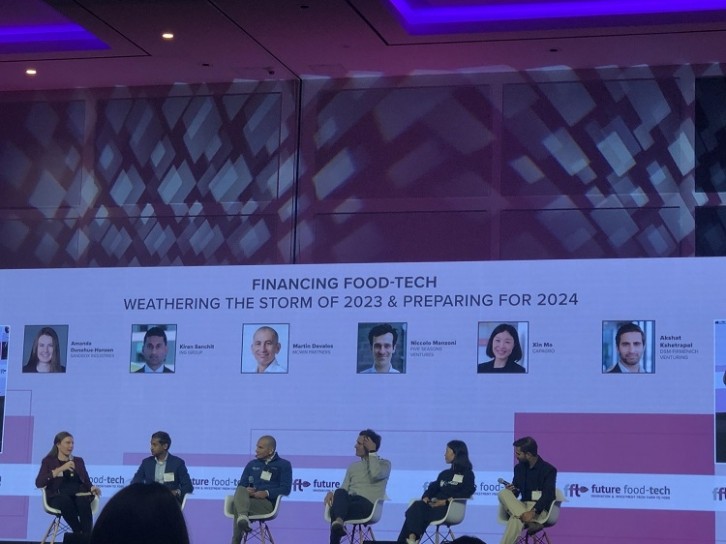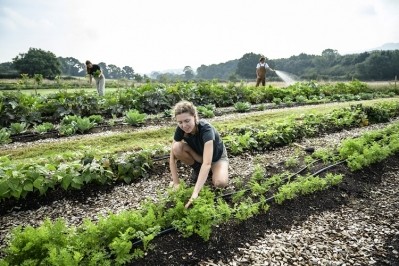‘Either they go bankrupt, or they need to adapt’: The investment landscape of food tech in 2023

“The best companies are created in times of crisis. The best entrepreneurs are also forged in times of crisis,” said Martin Davalos, Partner at food tech and food service investment firm McWin Partners.
Crisis resulting from inflation, supply chains, and changing markets was the main focus of the panel.
The decline of inflation and the return of the consumer
While inflation “is still there,” said Kiran Sanchit, Managing Director and Head of Food & Agri EME at Dutch bank ING Group, “it is less than it was last year. It’s very still active on certain food companies, but the industry has successfully been pausing the crisis to a high degree. So, it's clearly a turning point now, the inflationary environment is less, energy costs are less, the price has gone down with a few exceptions, you do see that there will be a return to slightly lower levels (of inflation).”
Niccolo Manzoni, Founding Partner at food-focused venture capital firm Five Seasons Ventures, added: “Despite headlines around inflation, war, and the cost-of-living crisis, which is talked about a lot, especially here in the UK,” he said, “the consumer has held up strongly. There is a lot of reasons; of course, excess savings coming from Covid; the unemployment rate exceptionally low; but sentiment remains pretty low as well, so you would think consumers would try to balance. I thought when people came back from summer holidays last year people would start spending less. And they haven’t.”
“The consumer is pretty strong on the food service side,” added McWin’s Davalos. “We haven't seen numbers come down at all, and despite inflation, the consumer is still there on the restaurant side.”
The bull departs
Entrepreneurs, suggest the panellists, have to learn that capital does not come as easily as it once did.
“Our biggest concern,” said Five Seasons Ventures’ Manzoni “is a bit of a skills gap (with) young experts today. They grew up in ten years of a really bullish market where capital was free, and it was very quick and easy to raise money.
“Now, they have to pay towards profitability - making difficult decisions, tightening the belt - and that, psychologically, is very difficult for some funders to accept, and some teams to accept. Incidentally, they kind of have to live through it, and either they go bankrupt and companies are going bankrupt, or they need to adapt. It’s Darwinian entrepreneurship.”

Xin Ma, Managing Director of food tech and agri-tech venture capital firm Capagro, agreed. “It's not easy. We try to tell our companies to just be patient, to accumulate their user base, and go deeper, build more industrial partners, and talk to more investors and have a pipeline of investors.
“It's really a long marathon. It’s really not about the higher the valuation the bigger the fundraising. It's really fundraising not as commodity but also about the resources behind the company.”
However, Akshat Kshetrapal, Investment Director at dsm-firmenich Venturing, the venture-capital arm of ingredients company dsm-firmenich, stressed that there are still plenty of companies with dry powder willing to invest. “Please recognise,” he said, “while you feel the pressure to raise capital, those who are sitting on piles of capital also feel their own pressures to deploy. There will always be pockets of capital that are desperate to get out.
“There is quite a lot of capital sitting with suppliers that they're willing to give on very good terms, so there are again pools of capital to access.”
Sustainability
“I think we have a consumer that is better organised, more aware of their choices and willing to vote with their pockets, especially when it comes to food choices, choices linked to sustainability,” said dsm-firmenich Venturing’s Kshetrapal. Many of the panellists, in fact, felt that sustainability was one thing that would shake up the investment landscape in the coming years.
Sustainability “is driving the large food companies more and more,” said ING Group’s Sanchit. “Most of the companies that we speak with have committed to the 1.5 degrees pathway, and also in their scope 3 emissions. So down in the value chain, this basically means a lot of investments have to take place; as you can imagine, not many companies have the intention to finance this by themselves.” Companies are looking at their partnerships, he suggested, to optimise their value chains and look to cut down on scope 3 emissions.
Capargro’s Ma mentioned the importance of paying close attention to regulations, and how they might affect startups, especially when it comes to sustainability.
“I think the thing to watch for is whether European regulators will be more bold with some technologies and open up with some new technology that has already been welcome elsewhere,” she said.
Regulation around carbon is also unclear, she suggested. “The startups are so keen to make some solutions but they’re not yet very clear what that regulatory framework institutions suggest.”







